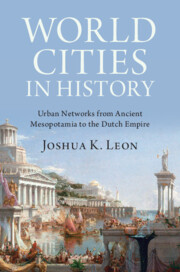
- Publisher:
- Cambridge University Press
- Online publication date:
- December 2024
- Print publication year:
- 2024
- Online ISBN:
- 9781009444958

Joshua K. Leon explores 6,000 years of urban networks and the politics that drove them, from Uruk in the fourth millennium BCE to Amsterdam's seventeenth-century 'golden age.' He provides a fresh, interdisciplinary reading of significant periods in history, showing how global networks have shaped everyday life. Alongside grand architecture, art and literature, these extraordinary places also innovated ways to exert control over far-flung hinterlands, the labor of their citizens, and rigid class, race and gender divides. Asking what it meant for ordinary people to live in Athens, Rome, Chang'an, or Baghdad - those who built and fed these cities, not just their rulers - he offers one of the few fully rendered applications of world cities theory to historical cases. The result is not only vividly detailed and accessible, but an intriguing and theoretically original contribution to urban history.
‘Leon has written the definitive worldwide analysis of pre-industrial cities. Interweaving politics and economics, he presents both the grandeur and the wretchedness of the world's historic ‘alpha cities.' From Uruk to Amsterdam, and with many fascinating stops in between, we learn how cities solved their inherent urban problems in similar yet distinctive ways. A genuine tour de force!'
Peter J. Taylor - Loughborough University
‘Leon's examination of how urban networks control capital and people draws on a wide range of scholarly disciplines including economics, archaeology, and political science. The book impresses with the vast geographic and temporal breadth of its case studies and its findings have significant implications for our understanding of how states and economies are constructed.'
Zachary C. Shirkey - Hunter College, CUNY
Leon's study forms an interesting challenge to triumphalist narratives of (western) cities as engines of progress. Harking back to a tradition of comparative-historical urban scholarship associated with V. Gordon Childe, with its stress on cities as elite powerhouses exploiting rural hinterlands, but also incorporating the insights of sociologists studying modern global cities' dystopian dimensions, the author undertakes an invigorating comparative grand tour of ‘world cities' over the past five thousand years which is sure to spark much debate.
Arjan Zuiderhoek - Ghent University
 Loading metrics...
Loading metrics...
* Views captured on Cambridge Core between #date#. This data will be updated every 24 hours.
Usage data cannot currently be displayed.